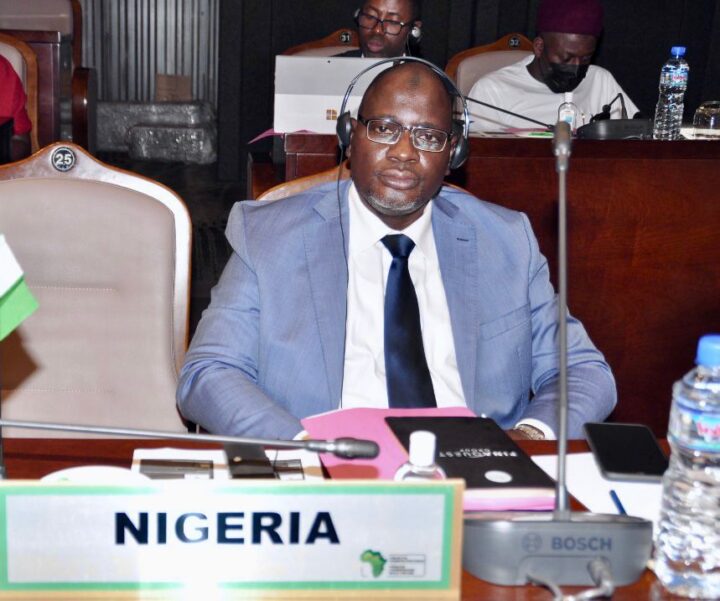LONDON, ENGLAND - DECEMBER 07: A visual representation of the digital Cryptocurrency, Bitcoin on December 07, 2017 in London, England. Cryptocurrencies including Bitcoin, Ethereum, and Lightcoin have seen unprecedented growth in 2017, despite remaining extremely volatile. While digital currencies across the board have divided opinion between financial institutions, and now have a market cap of around 175 Billion USD, the crypto sector coninues to grow, as it continues to see wider mainstreem adoption. The price of one Bitcoin passed 15,000 USD across many exchanges today taking it higher than previous all time highs. (Photo by Dan Kitwood/Getty Images)
Stakeholders in the financial sector have called for a regulatory framework for blockchain and cryptocurrency transactions in Nigeria.
They made the call on Tuesday in Abuja, at a blockchain/cryptocurrency policy conference organised by the National Chamber Policy Centre (NCPC) of the Abuja Chamber of Commerce and Industry (ACCI).
In February 2021, the Central Bank of Nigeria (CBN) directed banks to close accounts of persons or entities involved in cryptocurrency transactions.
Last month, CBN also penalised banks for flouting the directive on cryptocurrency.
Advertisement
Speaking at the event, Olawale Rasheed, executive director, NCPC, said despite the ban, Nigeria remains one of the top destinations for crypto trading with values increasing quarterly.
He said that it was necessary to adopt regulatory steps to reap the benefits and contain the negative exposure observable in the sector.
Rasheed noted that nations, except China, are not banning but rather creating structures to accommodate the crypto industry that is now almost two trillion dollars worldwide.
Advertisement
“The NCPC is, therefore, convinced that perceived evil of cryptocurrency should create a sense of urgency for the state to regulate rather than shut off or shut down the sector,” Rasheed said.
Also speaking, Uche Uwalaka, president, Association of Capital Market Academics of Nigeria, expressed concern that at present, there was no law specifically directed at cryptocurrencies or crypto assets.
He said there is an identity crisis in relation to the treatment of virtual currencies and assets in Nigeria.
“This explains in part why the CBN and the Securities and Exchange Commission appear to be asserting overlapping jurisdiction for market participants transacting in virtual currencies or other digital assets,’’ Uwalaka said.
Advertisement
He said that the existing financial regulations were inadequate to monitor and guide cryptocurrency activity in the financial system.
Uwalaka said they are also insufficient to protect the financial system from key risks such as fraud, money laundering, and the irreversibility of erroneous transactions.
“The government should do more to support blockchain innovation and adoption through supporting public sector adoption, creation of a flexible regulatory environment to allow experimentation, and using targeted regulatory enforcement,’’ he said.
He noted that cross-jurisdictional cooperation and government-industry collaboration were essential to developing a blockchain and cryptocurrency policy for Nigeria.
Advertisement
On his part, Abdul-Rasheed Na’ Allah, vice-chancellor, University of Abuja, said there was a need to educate Nigerians more on the issues of cryptocurrency.
Na’ Allah, who was represented by James Adefiranye, deputy director, Centre for Entrepreneurship Studies, University of Abuja, said it was important to ensure the end-users of cryptocurrency were protected.
Advertisement
“An average Nigerian today is extremely gullible and that has really exposed a lot of people to be defrauded easily,” he said.
“For this to be really successful in Nigeria, we must start by looking at Nigeria itself. We must look at people that understand blockchain, the technology, and the issues of cryptocurrency to know how they work.
Advertisement
“They need to get awareness on the various channels and avenues by which fraudster could take advantage of their zeal to make money and that is basic.”
For Toye Soladoye, chief technology officer, Union Bank, there should be core policies that would help in regulating cryptocurrency providers in Nigeria.
Advertisement
He said the outright ban will cost Nigeria so much, being a leader in the cryptocurrency space.
He added that regulation was important to check irregulariies while emphasising the importance of embracing the potential of cryptocurrency together with blockchain technology.
Add a comment







